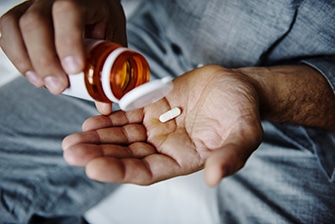Can I Take Medication to Stop Drinking?
With all the advances in modern medicine, it can be easy to wonder if there is a medication to stop drinking. Unfortunately, getting sober from alcohol isn’t as easy as simply taking medication. In addition to medication, therapy is required for the best long-term results, as well as support from loved ones and ongoing aftercare. However, there are some medications to help along in the process to stop withdrawal symptoms, block cravings, and create an aversion to alcohol.
It is important to not rely only on medication to stop drinking. A commitment to behavioral therapy, holistic therapy, family involvement, self-care, and ongoing aftercare are essential to the best long-term results possible.
Medication to Stop Drinking with Medication-Assisted Detox
Medication-assisted detox is the safest and most comfortable way to detox from any substance, including alcohol. Relapse is most common in the first 90 days of becoming sober and this is due, in part, to the extreme cravings experienced during withdrawal. By being able to control these withdrawal symptoms and cravings, people are much more comfortable and less likely to want to use.
Alcohol Withdrawal Symptoms
Some withdrawal symptoms from alcohol include:
- Anxiety
- Delayed reflexes
- Delirium tremens
- Dizziness
- Hallucinations
- High blood pressure
- High fever
- Insomnia
- Intense cravings
- Irritability
- Memory problems
- Mood swings
- Nausea
- Seizures
- Sluggish feeling
- Sweating
These withdrawal symptoms can vary in intensity due to many determining factors such as age, co-occurring mental illnesses, length of addiction and severity of the addiction.
Types of Medication to Stop Drinking
Disulfiram
Disulfiram can be a medication to stop drinking. It is a medication used to treat chronic alcoholism by causing unpleasant effects when even small amounts of alcohol are consumed. These effects begin about 10 minutes after alcohol enters the body and last for 1 hour or more. Disulfiram is not a cure for alcoholism, but it does help discourage drinking and is typically given upon entering treatment and before leaving treatment for alcohol use disorder.
The effects of consuming alcohol while taking Disulfiram can include:
- Flushing of the face
- Headache
- Nausea
- Vomiting
- Chest pain
- Weakness
- Blurred vision
- Mental confusion
- Sweating
- Choking
- Breathing difficulty
- Anxiety
Disulfiram is effective because it can help people begin new behavior patterns. By knowing they will become extremely ill by drinking even just a small amount of alcohol, they will avoid it and continue focusing on their recovery. With this extra padding for sobriety, people are more likely to avoid alcohol during triggering situations in their early days of recovery.
Naltrexone
One of the most difficult withdrawal symptoms to deal with during recovery is ongoing cravings. Individuals may experience cravings for years, which makes aftercare such an important part of addiction recovery. Since relapse is most common in the first 90 days of sobriety, many people may require additional medical assistance, in addition to behavioral therapy and support, to help curb the intense cravings they experience.
Naltrexone is used along with counseling and social support to help people who have stopped drinking alcohol and using street drugs continue to avoid drinking or using drugs. Naltrexone should not be used to treat people who are still using street drugs or drinking large amounts of alcohol. Naltrexone is in a class of medications called opiate antagonists. It works by decreasing the craving for alcohol and blocking the effects of opiate medications and opioid street drugs.
Acamprosate
Physical recovery is an important aspect of overcoming alcoholism. The body is lacking in nutrients and hydration, and the brain experiences various changes, as well. Withdrawal symptoms are a major side effect of these changes, and Acamprosate helps keep those symptoms at a minimum while helping the brain rebuild after alcohol abuse.
Acamprosate is used as a medication to stop drinking to help people avoid drinking alcohol again. Drinking alcohol for a long time changes the way the brain works, and acamprosate works by helping the brains of people who have drunk large amounts of alcohol to work normally again. Acamprosate does not prevent the withdrawal symptoms that people may experience when they stop drinking alcohol. Acamprosate has not been shown to work in people who have not stopped drinking alcohol or in people who drink large amounts of alcohol and also overuse or abuse other substances, such as street drugs or prescription medications.
About Cliffside Malibu
The safest and most comfortable way to stop drinking is by medication-assisted detox with an on-site addictionologist at Cliffside Malibu. Not only is our medical staff specially trained in addiction and its related health conditions, but our beautiful surroundings and resort-like facility will help start the path to recovery in the best way possible.
Since no two addictions are the same, Cliffside Malibu offers an individualized treatment plan for every client. We are committed to providing evidence-based treatment through a continuum of care model including medically supervised detox, residential treatment, day treatment, and outpatient services. Our program also includes family therapy and holistic therapy, as well. Whether an individual is suffering from substance abuse and/or alcohol addiction, our programs are structured to create a supportive environment where healing can begin.
In addition to world-class treatment, Cliffside Malibu offers luxury accommodations, a serene environment, five-star dining, and plentiful amenities. We understand that addiction treatment is a rigorous process. Therefore, we provide for your comfort and relaxation at every turn, allowing you to rejuvenate, and meet the demands of treatment with your greatest energy and attention.
For more information on Cliffside Malibu, visit cliffsidemalibu.com
